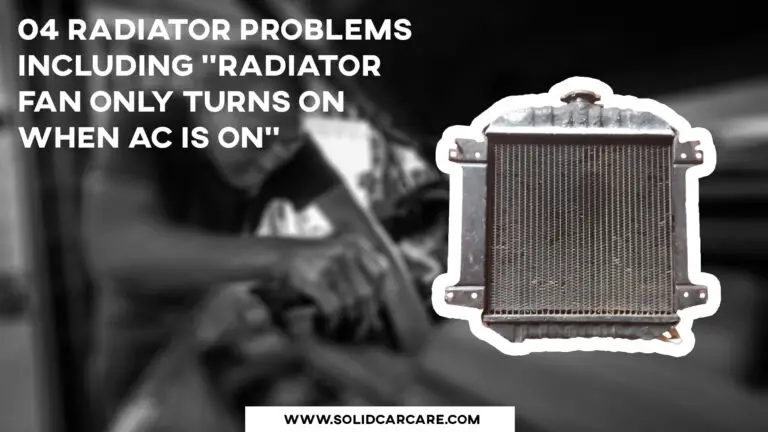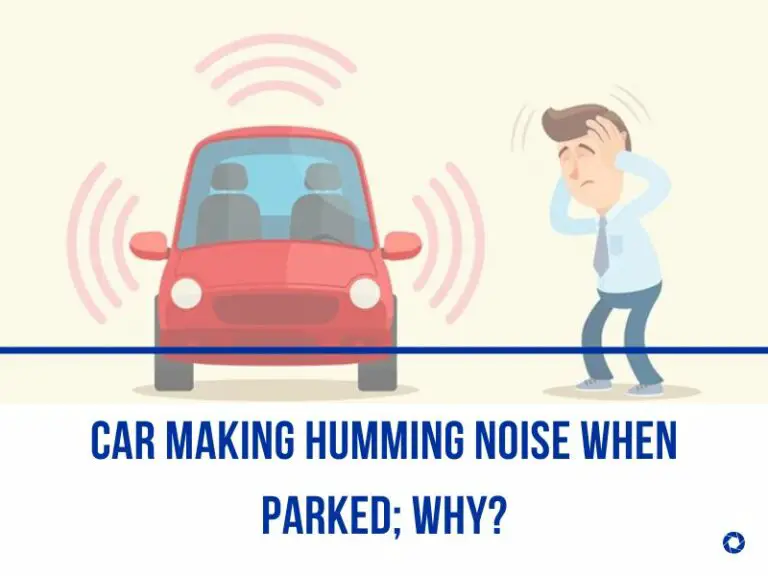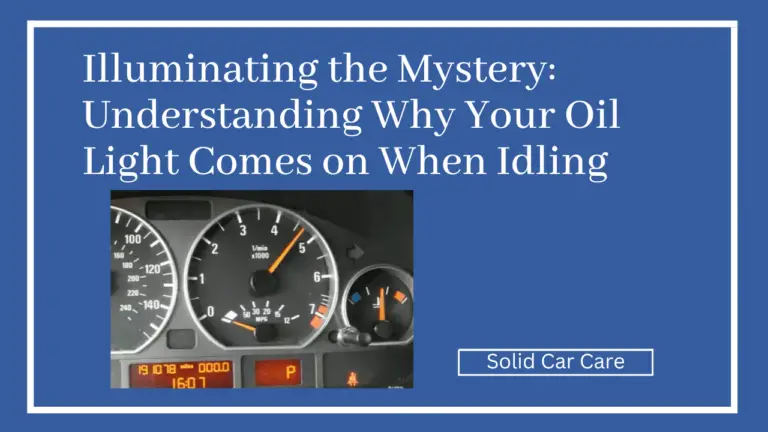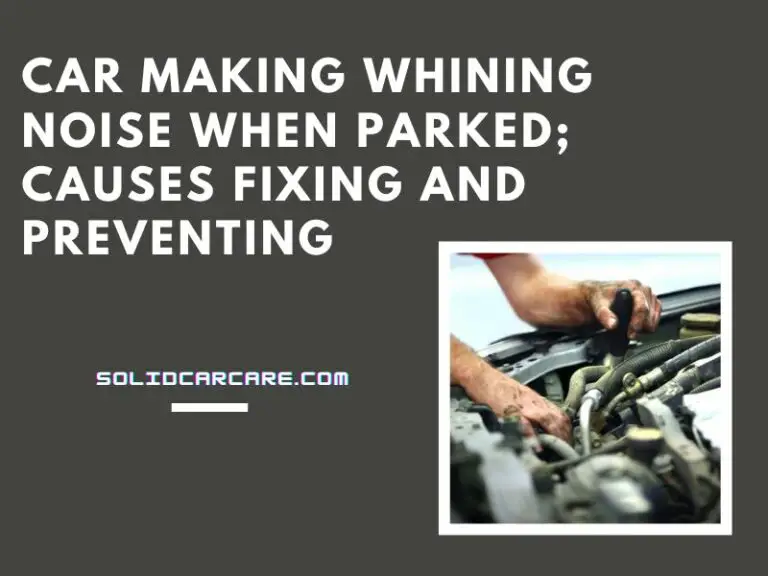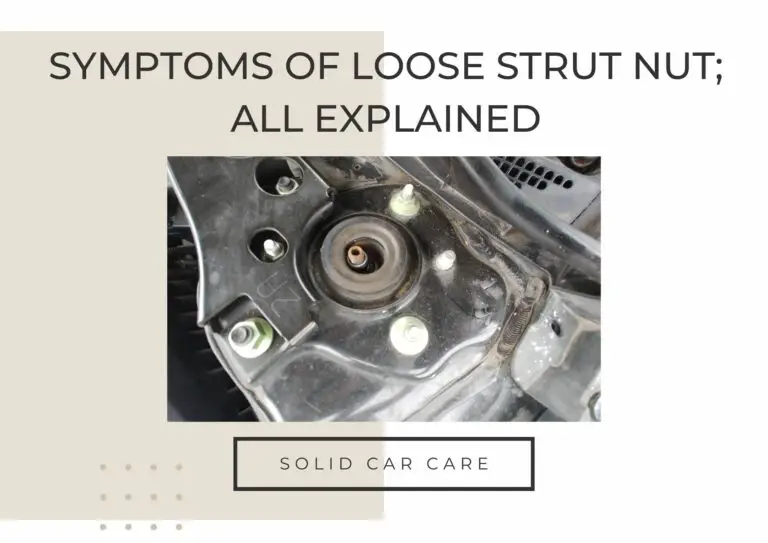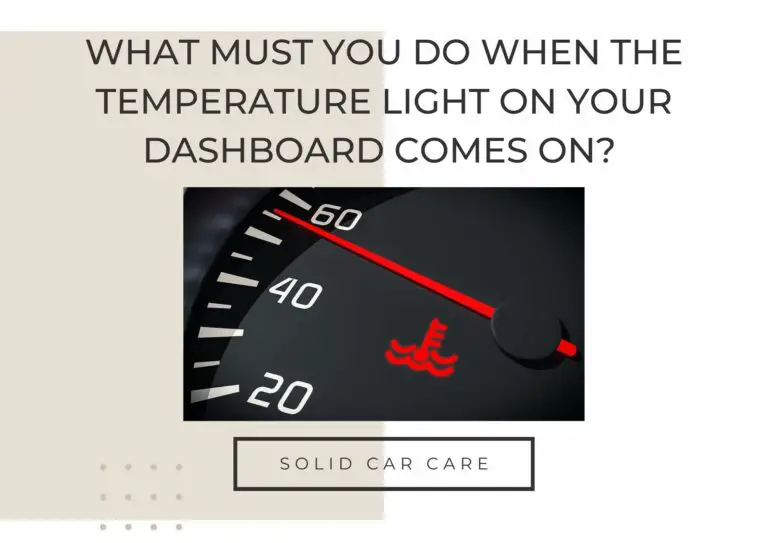Car Making Popping Noise When Parked; Causes And FIxing.

A popping noise while parked could stem from cooling metal components contracting, or suspension settling. It might also indicate issues like worn suspension parts or exhaust system. To resolve, inspect for loose parts, suspension wear, or exhaust problems. Consult a mechanic if unsure, ensuring safe and reliable vehicle operation.
Vehicles make different strange sounds when there is something wrong inside the vehicle. But every sound a vehicle makes is not because of the problems and you need to be aware of it because you may carry your vehicle to a mechanic without singe problems with it.
In this article, we discuss why popping noise comes when parked with all the relevant information you need. So stick around until the end to discover what you’ve been looking for.
Table of Contents
- Why does the popping sound come when parked?
- Front end of car making popping noise; causes and fixing
- Why does the car makes a popping noise when accelerating?
- Popping sound when car is idling; Why?
- What happens when the exhaust pops?
- Why does my car crackle when I turn it off? causes and fixing
- Some related FAQs.
Why does the popping sound come when parked?
There are several reasons for a popping sound in your car that needs repairing; some are normal and do not need a repair. So what are those common causes?
- The air filter is dirty.

One of the things that can set off your check engine light is a dirty air filter, which can also result in a popping sound when you stop your car after parking and a buildup of carbon deposits. Have your mechanic run a scan on your car to identify the issue; it may be as easy as changing the air filter.
Fix.
To fix it you will need to clean the air filter, and here is how to do it on your own.
- Take the filter off.
- Apply a cleaning agent.
- Rinse.
- Dry.
- Replace and oil.
When re-oiling these types of filters in modern vehicles that employ a Mass Air Flow (MAF) sensor, special caution must be taken to prevent over-oiling and damaging the MAF’s sensitive wires.
This might result in it measuring air consumption incorrectly and turning on the “check engine” light. Along the crown of each filter pleat, evenly distribute the oil spray. After that, squeeze out the extra liquid and put the filter back in its housing.
- Worn-out or corroded spark plugs

A spark plug that is worn out will result in poor mileage. Additionally, it may result in fuel waste and incomplete ignition. Misfires in engines An engine that misfires may also have worn spark plugs. They won’t ignite due to the possibility of improper combustion caused by defective spark plugs.
Fix.
You can attempt to clean the spark plug with sandpaper if it is only minimally dirty. Start by clearing away any debris from the spark plug’s exterior. After that, use 220-grit sandpaper to gently remove the buildup, being careful not to scratch the metal.
- Spark plug wires that are defective.

Your car may feel slightly “off,” which is the most obvious symptom of damaged spark plug wires. It might start slowly with poor gas mileage but could eventually stop accelerating. Also, faulty spark plug wires or misfires can result in difficult starting, a rough idle, and power loss.
Fix.
After wiping each wire with a cloth, inspect it carefully for insulation damage, cuts or scorch marks, corrosion between the boot (the end of the spark plug), the spark plug, and the coil, and other physical damage.
- Fuel filter clog.

Fuel tanks are prone to contamination in various ways, especially in marine vessels. sludge, other contaminants, and visible microbial growth inside a fuel tank. Moisture from condensation may enter the tank, forming a layer of water on top of the fuel.
Fix.
You can clean and reuse something if it’s made of metal and isn’t too filthy. Release the pressure in your fuel system before you start, and disconnect your battery.
The filter should be removed from the fuel lines and cleaned with a solvent. Reinstall it, connect your battery, and start your engine after letting it dry for an hour.
- Internal ignition wiring or an ignition-related problem.

The engine will stall if the ignition switch malfunctions while running and cuts off power to the fuel and ignition systems. The ability to restart the vehicle a short while later will depend on the specific problem.
Fix.
Depending on whether you hire a mechanic or do it yourself, the average cost to replace an ignition switch ranges from $98 to $215.
Taxes, fees, and your specific make and model are not considered in this price range, based on national averages for all automobiles.
Is it bad if your car pops?
Pops and bangs can indeed harm your engine. When the gears are changed, they may cause crackling that could ignite the exhaust pipe.
Some pops and bangs greatly delay ignition timing, causing the spark plugs to ignite as soon as fuel begins to exit the cylinder through the exhaust ports.
Rattling In Steering Wheel; Causes And Fixing.
solid car care
Front end of car making popping noise; causes and fixing
A popping noise originating from the front end of a car can arise from various sources, warranting prompt investigation. Common causes include worn-out suspension components like ball joints, control arms, or stabilizer links. These parts can develop play or damage, leading to the popping sound when the vehicle’s weight shifts during acceleration, turning, or braking.
Addressing this requires a thorough inspection of the front suspension components. Examine for signs of wear, tear, or visible damage on ball joints, control arms, and stabilizer links. If detected, replacement of the damaged part is essential to restore proper suspension functionality. It’s crucial to promptly address these issues, as compromised suspension components can jeopardize steering control and vehicle stability, compromising safety.
If the popping noise persists, the issue might lie in the CV joints, which transmit power to the front wheels. Worn CV joints can generate noise when turning, especially in sharp angles. CV joint replacement is recommended in such cases.
It’s advisable to consult a professional mechanic for accurate diagnosis and proper resolution. They can pinpoint the exact noise source, conduct necessary repairs, and ensure the front end operates smoothly, guaranteeing a safe and enjoyable driving experience.
Why does the car makes a popping noise when accelerating?
If you only hear popping when you accelerate, your fuel mixture or ignition timing may be off. Your car may make popping and knocking noises if it is running too lean (with insufficient fuel). The timing of your ignition system may also be to blame for these noises.
Unburned fuel typically “pops” and “crackles” as it exits the engine and ignites in the hot exhaust system. Sometimes flames from the exhaust will accompany it.
It will occur as the throttle is released and the revs drop after a car has accelerated quickly. This is also referred to as the “overrun.” When the engine is fed more fuel than it can efficiently burn, some fuel leaks into the exhaust, causing popping, backfires, and occasionally a crackling sound.
A catalytic converter greatly reduces this problem, which typically only affects sportier cars, but many owners of sportier cars choose to remove their cat for a variety of reasons. These “pops and bangs” can occasionally be one of the causes.
Popping sound when car is idling; Why?
Excess air or insufficient fuel are the two main causes of popping in the exhaust system. This indicates that the combustion chamber is burning too hotly, which causes the exhaust to be warmer than it should be and to continue burning fuel when it reaches the exhaust system.
One or more cylinders misfiring as a result of ignition or fuel problems is a likely cause. Compared to valve issues, this is almost always cheaper and simpler to fix.
The combustion event may also leak into the exhaust system if one or more exhaust valves are not seating properly, which is another potential cause. If there is a problem, it will be discovered by a cylinder leak-down test.
What happens when the exhaust pops?
A rich engine slows down the combustion process because it has too much fuel and not enough air. The exhaust valve opens as the air-fuel mixture is still igniting when combustion doesn’t occur as quickly as it should, causing the explosion to “spill” out of the cylinder and produce a loud popping sound.
What does a blown exhaust manifold sound like?
A leaky exhaust manifold almost always makes a ticking or tapping noise. When the engine and manifold are both cold before starting, the sound is frequently audible more loudly.
Once the engine has warmed up and the manifold expanding has sealed the leak, the noise may become less or even disappear.
Why does my car crackle when I turn it off? causes and fixing
A crackling noise when turning off your car can result from various causes. One common culprit is the heat shield around the exhaust system. Over time, these shields can corrode, causing them to crackle as they cool down after the engine is turned off. Additionally, the sound might be due to thermal expansion and contraction of metal components in the engine bay.
To address this, start by visually inspecting the heat shields for any visible damage or loose parts. If damage is evident, consider having the heat shield replaced. If the noise persists, it could be related to engine components settling as they cool. Routine maintenance and checks on engine components can help alleviate such noises.
If the crackling noise is accompanied by other issues like rough idling or decreased performance, seeking a professional mechanic’s expertise is advised to diagnose and address potential underlying problems.
Some related FAQs.
What causes popping in front end?
When you experience a problem like this, it’s typically due to a worn-out CV joint, a loose or damaged strut, a damaged strut mount, or a damaged stabilizer bar bushing. The part that would typically make the “clunk” sound when hitting a bump is the stabilizer bar bushing.
What does a popping tire sound like?
Your car may first make a loud boom or bang, which is a tire popping sound that reverberates throughout it. The sound of your tire losing air is followed by a whooshing sound, and the sound of your deflated tire repeatedly striking the ground is a flapping or flopping sound.
Can a wheel bearing make a popping noise?
Worn wheel bearings can make a variety of noises, including the disputed clicking and popping sounds as well as snapping, grinding, and humming. Uneven tire wear, wheel vibrations, and strange brake behavior are signs of worn wheel bearings.

